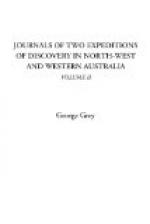(Footnote. Page 90.)
...
A family seldom make a distant friendly visit to other tribes, but they bring back a new song or two with them, and these, for a time, are quite as much the rage as a new fashionable song in England. Occasionally the songs also bear the name of the poet who composed them, though this is not often the case; there are however two or three poets in Australia who enjoy a great celebrity, but whether they are living, or belonged to ancient times, or whether they are merely imaginary beings I have never been able to discover.
DISREGARD OF EUROPEAN MUSIC. NATIVE OPINION OF EUROPEAN SINGING.
Their own songs are, according to their idea, the very perfection of harmony, rude and discordant as they are to our ears; perhaps no more extraordinary instance of the force of habit and diversity of taste than this could be advanced. A native sings joyously the most barbarous and savage sounds, which rend asunder the refined ears of the European, who turns away in agony from the discordant noise while the surrounding natives loudly applaud as soon as the singer has concluded. But should the astounded European endeavour to charm these wild men by one of his refined and elegant lays they would laugh at it as a combination of silly and effeminate notes, and for weeks afterwards entertain their distant friends, at their casual meetings, by mimicking the tone and attitude of the white man; an exhibition which never fails to draw down loud shouts of applause.
Some of the natives are not however insensible to the charms of our music. Warrup, a native youth who lived with me for several months as a servant, once accompanied me to an amateur theatre at Perth, and when the actors came forward and sang God save the Queen he burst into tears. He certainly could not have comprehended the words of the song, and therefore must have been affected by the music alone.
ADAPTATION OF DANCES TO THEIR SONGS.
The only accompaniment to their songs used in the southern parts of the continent is the clapping of hands or the beating of a short round stick against the flat board with which they throw their spears; in this latter case the rounded stick is held in its centre, between the fingers and thumb of the right hand, and its ends are alternately struck against the flat board in such a manner as to produce a rude kind of music, in time to the air they are singing. Although this appears to be so very simple an instrument it requires some practice to beat the time accurately, and by young men who desire to have the reputation of being exquisites this is considered to be a very necessary accomplishment.
Some songs have a peculiar dance connected with them; this however is not always the case, and I have occasionally seen the same dance adapted to different songs.
Having given this general outline of their songs I will now add such a selection of them as will convey some idea of the character of their poetry, at the same time there is reason to believe that a good deal of it is traditional, and may date its origin from a very remote epoch. Some of their dances have also a very peculiar mystical character about them, and these they very unwillingly exhibit in the presence of Europeans.




